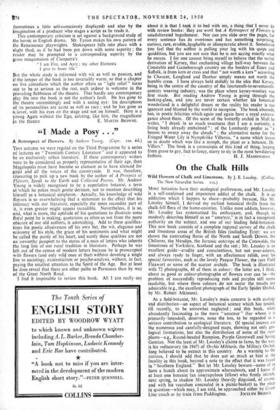44I Made a Posy. . . 1) A. Retrospect of Flowers.
By Andrew Young. (Cape. los. 6d.)
Tins autumn we were regaled on the Third PrOgramme by a series of lectures on "Twentieth Century Literature" and it appeared to be an exclusively urban literature. If these contemporary writers were to be considered as properly representative of their age, then Megalopolis must have become so clamant as to have silenced for god and all the voices of the countryside. It was, therefore, regssuring to piek up a new book by the author of A Prospect of Ftqwers. Speak to the Earth and Collected Poems. Mr. Andrew Young is widely recognised to be a superlative botanist, a term at *which he pokes much gentle 'derision, not to mention describing himself as a botanical simpleton.- Actually, his knowledge of wild flowers is so overwhelming that" a -statement to the effect that his intimacy with our literature, especially the more recondite part of it, is even greater might appear incredible. NeVertheless, it is so, and, what is more, the aptitude of his quotations to illustrate some floral point he is making, quotations as often as not from the more obscure of our old authors, is astonishing. Add to these qualifica- tiops his poetic allusiveness off his ow bat, the wit, elegance and economy of his style, the grace of his sentiments and what might be'called the purity of his heart, and surely these qualities are not an unworthy passport to the status of a man of letters who inherits the long line of our rural tradition in literature. Perhaps he was left out of the census of modern letters because he is preoccupied with flowers (and only wild ones at that) without devoting a single line to sociology, existentialism or psycho-analysis, without, in fact, paying the smallest attention to the Spirit of the Age. But at least he does reveal that there are other paths to Parnassus than by way of the Great North Road.
find it impossible to review this book. All I can really ,say about it is that I took it to bed with me, a thing that I never do with review books: 'they are work but A Retrospect of Flowers is unadulterated beguilement. Nor can you slide over the pages, for every sentence has its overtones and has something surprising, curious, rare, erudite, laughable or idiosyncratic about it. Sometimes you feel that the author is pulling your leg with his .quips and quiddities, but you are not sure that he is not saying exactly what he means. I for one cannot bring myself to believe that the verbal derivation of Kersey, that enchanting village half-way between the Constable and Gainsborough country on the borders of Essex and Suffolk, is from kers or cress and that "not worth a kers " according to Chaucer, Langland and Dunbar simply means not worth the humble cress. I have always held stolidly to the idea that Kersey, being in the centre of the country of the fourteenth-to-seventeenth- century weaving industry, was the place where kersey-woolsey was first made. But reading Andrew Young is going through the looking-glass, and you are never certain whether his botanical wonderland is a delightful dream or the reality his reader is too ignorant and blunted by the world to recognise. The book abounds, too, in poetic felicities which again and again have a royal extrava- gance about them. ONhe scent of the butterfly orchid in Mull he writes, "I drank in so much sweetness that I am a curiosity, a living body already embalmed " ; of the Lombardy poplar as "a besom •to sweep away the clouds " ; the alternative name for the Fringed Water Lily is Nymph-like Villarsia, "a name which leaves us in doubt which was like a nymph, the plant or a botanist, Dr. Villars." The book is a cornucopia of this kind of thing, leaping from grave to gay, fact to fancy, starry to sly in the most bewildering














































































 Previous page
Previous page